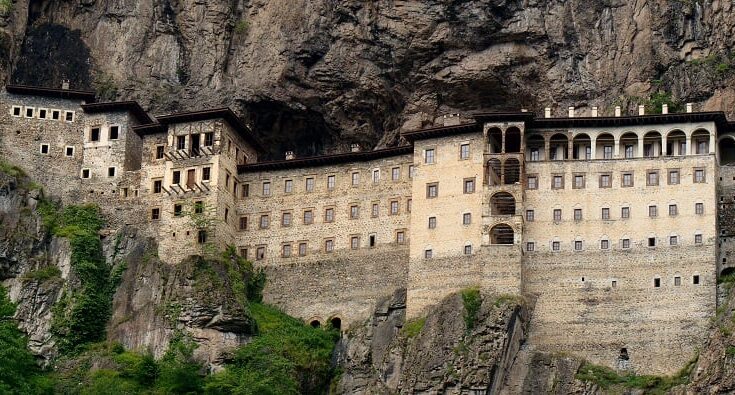Turkey has forbidden the liturgy at the historic Orthodox monastery of Panagia Soumela, dedicated to the Virgin Mary, on the August 15th religious holiday.
Instead, it has allowed a liturgy to take place on Friday, August 23rd.
Each year on August 15th, Greeks around the world celebrate “Summer Easter,” as the Dormition of the Virgin Mary is called in Greek popular tradition. The nation is also ready to honor those bearing Greece’s most popular female name, Maria.
The Ecumenical Patriarch in Constantinople said that Patriarch Bartholomew will instead officiate a liturgy on August 15th at his birthplace on the island of Imbros.
Turkey’s ban on August 15th liturgy at Panagia Soumela
Turkey also banned the liturgy last year. At the time, Greek diplomatic sources told the Athens-Macedonian News Agency (AMNA) that the decision by the Turkish authorities was an extremely disappointing development for all those who follow the Greek Orthodox faith and the pilgrims who expected to visit it.
The same sources, who have not been named, added that “the Holy Monastery of Panagia Soumela, which was a candidate for inclusion in the UNESCO World Heritage List and has always been a significant place of religious worship for all Christians, should have the greatest possible protection and be fully accessible to everyone.”
The liturgy was held at the restored monument in both 2022 and 2021 after it had been closed since 2015 for restoration and reinforcement works.
Panagia Soumela was founded around AD 386
Panagia Soumela is dedicated to the Virgin Mother and is located at Karadağ (meaning “Black Mountain”) in the Trabzon Province in Turkey.
Nestled in a steep cliff at an altitude of about 1,200 meters (3,900 ft) facing the Altındere valley, it is a site of great historical and cultural significance. It is also a major tourist attraction within Altındere National Park.
Due to an increased risk of avalanches, on September 22, 2015, the monastery was closed to the public for safety reasons for the duration of one year so as to resolve the problem. This was later extended to three years. It reopened to tourists on May 25, 2019.
The monastery was founded around AD 386 during the reign of Emperor Theodosius I. It is believed that two Athenian monks named Barnabas and Sophronios founded the monastery. It became famous for an icon of the Theotokos known as the Panagia Gorgoepekoos, said to have been painted by the Apostle Luke.
During its long history, the monastery fell into ruin several times and was restored by various emperors. It acquired its present form in the 13th century after gaining prominence during the existence of the Empire of Trebizond.
In February 2022, Greece and Ecumenical Patriarch Bartholomew blasted Turkey over the “desecration” of the Panagia Soumela Monastery, which was turned into a nightclub for a marketing music video.
The controversial video, depicting a DJ playing loud electronic music in the courtyard of the historic monastery with people dancing around him, led to Orthodox Christian followers reacting in anger.
Related: The Panagia Soumela Icon, the Symbol of Hellenism in Pontus



